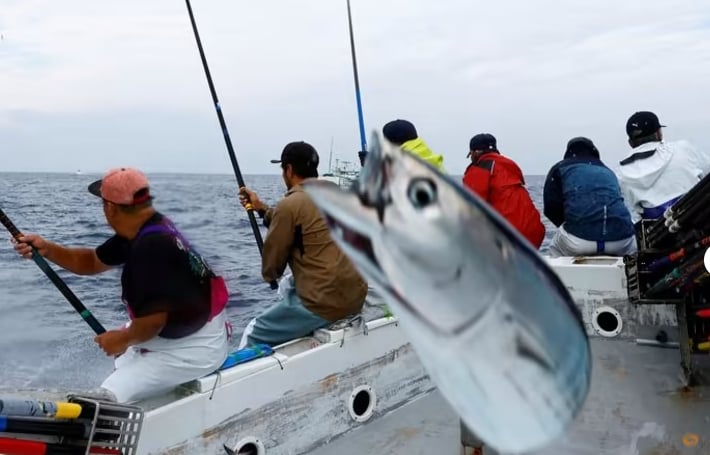June 20, 2025 | 10:49 GMT +7
June 20, 2025 | 10:49 GMT +7
Hotline: 0913.378.918
June 20, 2025 | 10:49 GMT +7
Hotline: 0913.378.918

Crew members on the Nakajomaru katsuo (skipjack tuna) fishing boat catch katsuo using traditional ipponzuri (single pole fishing method) in Tosa Bay, Koichi Prefecture, Japan, May, 15, 2022. Photo: RT
The Nature Sustainability journal study, which centred on three species of tuna, found climate change would likely change their migration patterns. That raised the potential for conflict between some of the world’s most valuable fisheries and the prospective mining in the Clarion-Clipperton Zone southeast of Hawaii.
Mining companies say the ocean floor is potentially rich in metals including nickel and cobalt used in batteries for electric vehicles, so their extraction will support the global energy transition.
The U.N. body that regulates the sector is expected to press pause on plans to extract minerals from the ocean floor when it meets this month due to environmental and economic risks.
“The high seas harbor a trove of biodiversity, and there are critical sectors of our economy that depend on this biodiversity,” said study co-author Dr. Juliano Palacios Abrantes from the University of British Columbia.
“There is already uncertainty about the impact of climate change on the health and geographic range of tuna. Deep-sea mining will only add to this uncertainty, further threatening tuna species and associated fisheries.”
Potentially impacting the fish would be plumes of sediment stirred up by mining of sea nodules and any associated noise or light pollution that could impact reproduction rates, among other issues, the study found.
The research was released alongside a letter from seafood industry groups advocating for a pause in deep-sea mining development until the socioeconomic and environmental impacts could be more thoroughly analysed.
"In the vast expanse of the high seas, critical for tuna species, we find ourselves sailing into uncharted territory with the unknown risks posed by deep-sea mining,” said Daniel Suddaby, executive director at Global Tuna Alliance whose 48 industry partners account for 32 per cent of the global tuna trade.
(Reuters)

(VAN) Poultry production in Poland, which has only started recovering from devastating bird flu outbreaks earlier this year, has been hit by a series of outbreaks of Newcastle disease, with the veterinary situation deteriorating rapidly.

(VAN) Extensive licensing requirements raise concerns about intellectual property theft.

(VAN) As of Friday, a salmonella outbreak linked to a California egg producer had sickened at least 79 people. Of the infected people, 21 hospitalizations were reported, U.S. health officials said.

(VAN) With the war ongoing, many Ukrainian farmers and rural farming families face limited access to their land due to mines and lack the financial resources to purchase needed agricultural inputs.

(VAN) Vikas Rambal has quietly built a $5 billion business empire in manufacturing, property and solar, and catapulted onto the Rich List.

(VAN) Available cropland now at less than five percent, according to latest geospatial assessment from FAO and UNOSAT.

(VAN) Alt Carbon has raised $12 million in a seed round as it plans to scale its carbon dioxide removal work in the South Asian nation.